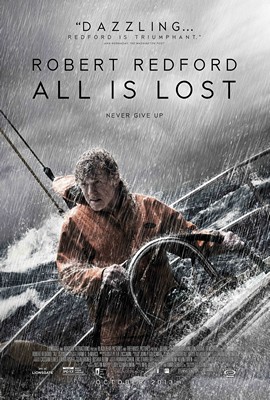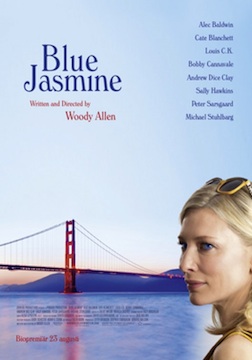
I know, I know, I know: it’s “Hunger Games: Catching Fire” week but I saw two notable films recently that are still on my mind. First, the Robert Redford film “All Is Lost” about a 70-ish year-old man sailing solo in the Indian Ocean whose boat collides with a shipping container. He’s left struggling to survive for eight days adrift at sea, with seemingly no one else around for hundreds of miles.
It’s a different kind of film because it’s so quiet and just one person is in it, with no dialogue. It has a documentary feel to it as you watch the sailor (played by Redford) try to repair the damaged boat and overcome the elements. He moves methodically about his work and remains calm in the face of a very scary situation. At points you want him to hurry up (!) as the water swells in the boat, but he moves slowly as an older person and must be a seasoned sailor because he doesn’t panic like I would be doing.
You might wonder after his boat radio goes out why he doesn’t have a GPS device to locate his position or the internet or an emergency beacon to alert others to rescue him, but alas no. He’s way out there, alone with none of these things, which perhaps might speak to what kind of person he is or what he’s doing out there in first place. You might also second-guess a couple other decisions of him as a sailor, such as leaving the boat to jump onto the drifting container, or going on deck during a tropical cyclone, or not wearing a life jacket at certain times, but despite such recklessness, you’ll be taken in, too, by his utter resourcefulness and courage as he’s adrift at sea. He’s no quitter.
Redford is terrific in the role as a man facing his own mortality. Perhaps not since 1972’s “Jeremiah Johnson” has he shone as a survivor like this. Apparently the 77-year-old Redford insisted on doing all his own stunts in the film, which makes it feel quite real. “All Is Lost” is a quiet, yet compelling meditation at sea.

“Blue Jasmine,” on the other hand, is a film completely different from that but also includes a strong performance of the lead character played this time by Cate Blanchett. I do hope Ms. Blanchett receives some award nominations because she is superb as the New York socialite Jasmine who comes to stay with her sister in San Francisco after her life falls apart.
The story of what goes wrong in New York for Jasmine and her very rich financier husband (played by Alec Baldwin) unfolds in flashbacks while Jasmine is trying to get back on her feet in California.
In San Fran, the dynamic between the sisters is awkward at best, whereas Jasmine’s been wealthy, and is a bit haughty, her sister is divorced with two boys, doesn’t have much money, and is dating a low-life mechanic. Jasmine influences her sister to see someone better, while she eventually meets a well-to-do man who plans to run for Congress. But eventually all begins to unravel once the veneer Jasmine’s created gets pulled away.
It’s typical Woody Allen: a film full of relationships, deceits and their sticky consequences. It’s a bit depressing, watching the impending outcome. I didn’t think of a modern-day version of Tennessee Williams’s “A Streetcar Named Desire” when I was watching it, but have read since that some critics have compared it to that. And I guess the plot of “Blue Jasmine” is quite like that: A troubled woman comes to stay with her sister and affects her sister’s relationship with her guy and things end badly for her. It differs a bit in this modern telling with more characters etc., but there are some similarities.
The best part of “Blue Jasmine” is the cast and acting. Blanchett, of course is excellent as Jasmine, but so is Sally Hawkins as her sister who plays off Jasmine so well. Then there’s Andrew Dice Clay (remember the crude, stand-up comedian?) who is surprisingly good as the sister’s ex-husband, as well as Bobby Cannavale who plays the sister’s mechanic boyfriend, Chili. I was delighted, too, to see comedian C.K. Louis play the guy the sister has a fling with. He’s terrific! How can anyone not like C.K., even though his role here is pretty slimy.
Despite its dark overtones, “Blue Jasmine” makes for an entertaining romp, thanks to its cast that gives the script just the right touch.
